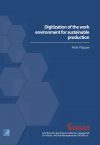Search


Bibtex
Cite as text
@Article{Trapp+Kreutz+Lütjen+Freitag,
Cite-key = "Trapp2022",
Year= "2022",
Volume= "Schriftenreihe der Wissenschaftlichen Gesellschaft für Arbeits- und Betriebsorganisation (WGAB) e. V.",
Pages= "1-15",
Journal = "WGAB",
Title= "Improving Sustainability of Footwear Production through 3D Printing of Shoes",
Author= "Markus Trapp1, Markus Kreutz2, Michael Lütjen1, Michael Freitag1,2
1 BIBA - Bremer Institut für Produktion und Logistik an der Universität Bremen
2 Universität Bremen, Fachbereich Produktionstechnik
",
Doi= "https://doi.org/10.30844/WGAB_2022_1",
Abstract= "The production of apparel and footwear has a significant impact on the environment. In 2016, these two product categories accounted for about 8 % of global climate emissions. To reach global emission goals, different production strategies are required. As an additive manufacturing process, 3D printing offers the possibility of mass customisation by combining the cost advantages of mass production and the individualisation of custom-made products. We present an approach to using FFF 3D printers to produce complete shoes, eliminating the need for auxiliary materials and many manufacturing steps. Here, mass customisation is done by adapting digital shoe models to customers' foot scans, creating individualised one-off pieces. Considering only the production process, emissions from a pair of 3D printed shoes are slightly higher than conventionally manufactured shoes. Beyond the environmental aspects, 3D printed shoes have advantages in the aspects of social and economic sustainability. The burden on workers can be reduced, and the possibility of decentralised production with comparatively low costs allows more people to participate in the production process actively.
",
Keywords= "Additive Manufacturing, 3D Printing, Footwear, Sustainability, CO2 Emissions
",
}
Markus Trapp1, Markus Kreutz2, Michael Lütjen1, Michael Freitag1,2
1 BIBA - Bremer Institut für Produktion und Logistik an der Universität Bremen
2 Universität Bremen, Fachbereich Produktionstechnik(2022): Improving Sustainability of Footwear Production through 3D Printing of Shoes. Schriftenreihe der Wissenschaftlichen Gesellschaft für Arbeits- und Betriebsorganisation (WGAB) e. V.(2022), S. 1-15. Online: https://doi.org/10.30844/WGAB_2022_1 (Abgerufen 23.02.26)
Open Access
Abstract
Abstract
The production of apparel and footwear has a significant impact on the environment. In 2016, these two product categories accounted for about 8 % of global climate emissions. To reach global emission goals, different production strategies are required. As an additive manufacturing process, 3D printing offers the possibility of mass customisation by combining the cost advantages of mass production and the individualisation of custom-made products. We present an approach to using FFF 3D printers to produce complete shoes, eliminating the need for auxiliary materials and many manufacturing steps. Here, mass customisation is done by adapting digital shoe models to customers' foot scans, creating individualised one-off pieces. Considering only the production process, emissions from a pair of 3D printed shoes are slightly higher than conventionally manufactured shoes. Beyond the environmental aspects, 3D printed shoes have advantages in the aspects of social and economic sustainability. The burden on workers can be reduced, and the possibility of decentralised production with comparatively low costs allows more people to participate in the production process actively.
Keywords
Schlüsselwörter
Additive Manufacturing, 3D Printing, Footwear, Sustainability, CO2 Emissions
References
Referenzen
.

 Deutsch
Deutsch
